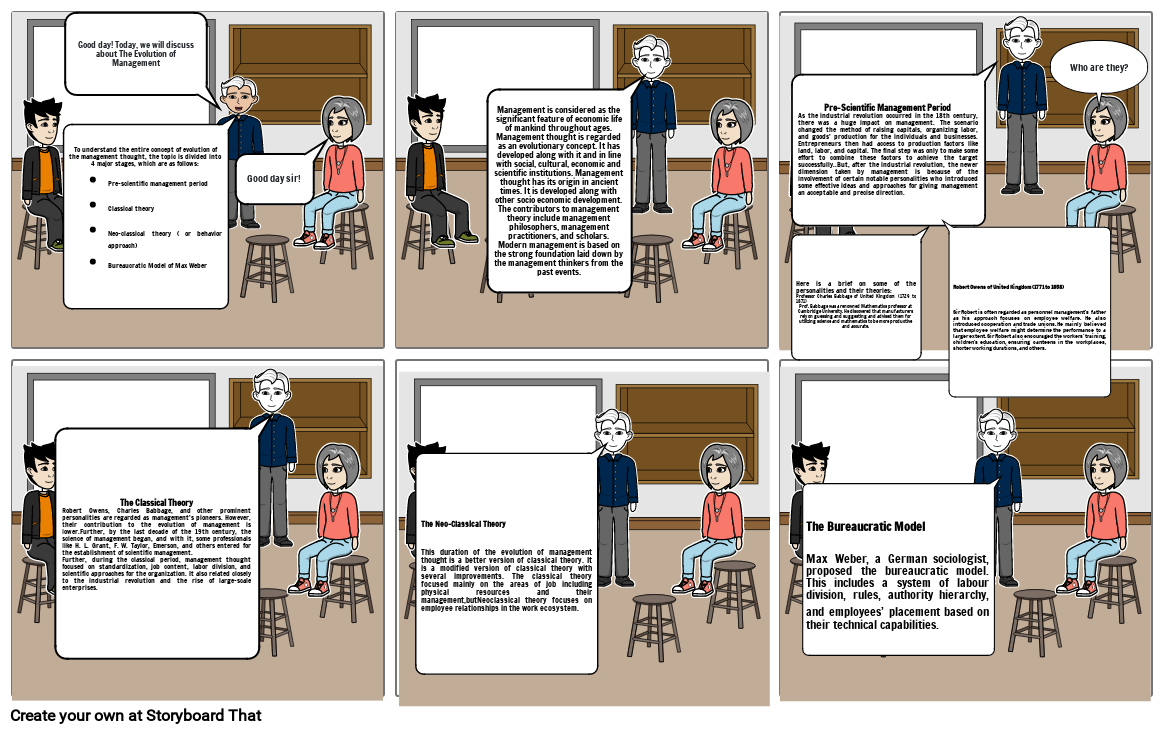Unknown Story

Süžeeskeem Tekst
- To understand the entire concept of evolution of the management thought, the topic is divided into 4 major stages, which are as follows:Pre-scientific management periodClassical theoryNeo-classical theory ( or behavior approach)Bureaucratic Model of Max Weber
- Good day! Today, we will discuss about The Evolution of Management
- Good day sir!
- Management is considered as the significant feature of economic life of mankind throughout ages. Management thought is regarded as an evolutionary concept. It has developed along with it and in line with social, cultural, economic and scientific institutions. Management thought has its origin in ancient times. It is developed along with other socio economic development. The contributors to management theory include management philosophers, management practitioners, and scholars. Modern management is based on the strong foundation laid down by the management thinkers from the past events.
- Here is a brief on some of the personalities and their theories:Professor Charles Babbage of United Kingdom (1729 to 1871)Prof. Babbage was a renowned Mathematics professor at Cambridge University. He discovered that manufacturers rely on guessing and suggesting and advised them for utilizing science and mathematics to be more productive and accurate.
- Pre-Scientific Management PeriodAs the industrial revolution occurred in the 18th century, there was a huge impact on management. The scenario changed the method of raising capitals, organizing labor, and goods’ production for the individuals and businesses. Entrepreneurs then had access to production factors like land, labor, and capital. The final step was only to make some effort to combine these factors to achieve the target successfully..But, after the industrial revolution, the newer dimension taken by management is because of the involvement of certain notable personalities who introduced some effective ideas and approaches for giving management an acceptable and precise direction.
- Robert Owens of United Kingdom (1771 to 1858)Sir Robert is often regarded as personnel management’s father as his approach focuses on employee welfare. He also introduced cooperation and trade unions. He mainly believed that employee welfare might determine the performance to a larger extent. Sir Robert also encouraged the workers’ training, children’s education, ensuring canteens in the workplaces, shorter working durations, and others.
- Who are they?
- The Classical TheoryRobert Owens, Charles Babbage, and other prominent personalities are regarded as management’s pioneers. However, their contribution to the evolution of management is lower.Further, by the last decade of the 19th century, the science of management began, and with it, some professionals like H. L. Grant, F. W. Taylor, Emerson, and others entered for the establishment of scientific management.Further, during the classical period, management thought focused on standardization, job content, labor division, and scientific approaches for the organization. It also related closely to the industrial revolution and the rise of large-scale enterprises.
- The Neo-Classical TheoryThis duration of the evolution of management thought is a better version of classical theory. It is a modified version of classical theory with several improvements. The classical theory focused mainly on the areas of job including physical resources and their management,butNeoclassical theory focuses on employee relationships in the work ecosystem.
- The Bureaucratic ModelMax Weber, a German sociologist, proposed the bureaucratic model. This includes a system of labour division, rules, authority hierarchy, and employees’ placement based on their technical capabilities.
Loodud üle 30 miljoni süžeeskeemi

